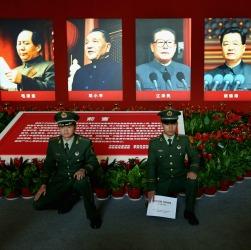BOB GARFIELD: The election here is over but the world’s second largest economy is experiencing its own political intrigue. The 18th Chinese Communist Party Congress started Thursday and will continue for one week. Other than that, there’s little we know about this Congress. We do know that General Secretary Hu Jintao will be replaced by Xi Jinping but the real intrigue is who will make up the Party’s Standing Committee, the people who, behind the scenes, run the country and, as a consequence, are some of the most powerful people on earth. There are Western journalists in Beijing covering the conference but, according to Time Magazine's Hannah Beech, it's often an exercise in the absurd.
HANNAH BEECH: So, for instance, we were given a few days ago these baseball caps that said something like the Press center of the 18th National Congress of CPC, and CPC means the Communist Party of China. And we were also given backpacks, The backpacks came with little price tags that said that they cost about $60 and instructions that said that we could put our maps and umbrellas and ice axes in the bag. And I'm pretty sure –
[BOB LAUGHS]
- we won’t be needing ice axes.
BOB GARFIELD: As one does when covering a convention.
HANNAH BEECH: Sure. You know, who – who knows what’s going to happen. You know, but the fact is that this press kit that we received didn't have a single piece of information about what it was we would actually be covering. There were no details about press conferences, you know, or schedules of what was going to happen. We’re covering a black box hidden behind a bamboo curtain. At the end of the Party Congress, we will see what we think are seven man who will walk onto a stage and by the order through which they walk on the stage, we’ll figure out who's going to be number one, who's going to be number two, who’s gonna be 3, 4, 5, 6, 7? That’s the extent of our sort of engagement with the political process in China.
BOB GARFIELD: Apart from how silly some of this stuff is, there – there’s something substantially more disturbing about this whole weird exercise of going through the motions of accommodating the press, amid genuine repression of information and any kind of dissent whatsoever. It sounds to me like a bit surreal.
HANNAH BEECH: We were told that we can’t float balloons or release homing pigeons, which is sort of a popular pastime in Beijing because they might fly towards the great Hall of the People, where the delegates are gathered and do something nasty. Beijing taxi drivers have been told that if they have manual rear window handles, they have to disable them because maybe somebody's going to open the window and flutter out anti-government leaflets. There is a security state that is trying to control what could potentially be uncontrollable.
There are fundamental disconnects between the way in which the Party is, I think, generally trying to address sort of the international standard of how to deal with the media and the reality that it also wants to very strongly control the people.
BOB GARFIELD: You know, I think maybe foreign correspondents such as yourself are having difficulties, but if you go to the Chinese media they've done some really fantastic reporting. I just want to read this one brief passage from one of the major Chinese papers.
“The plenary session comprehensively analyzed the current situation and task, deeply discussed several important issues concerning developing the great cause of socialism with Chinese characteristics under the new situation, making full preparation for the convention of the 18th CPC National Congress.“ Now [LAUGHS], I’m gonna take a wild stab and guess that in Mandarin it isn't any less abstruse.
HANNAH BEECH: Yes, it is equally abstruse and sleep-inducing in Chinese.
BOB GARFIELD: Should we be heartened in the West that China at least sees the necessity of mimicking the West? Or should we be discouraged that they can still hide behind the bamboo curtain?
HANNAH BEECH: I would prefer to see the glass half full. What has changed is the rise of social media in China and something called Weibo. Because Twitter and Facebook are blocked in China, there are sort of Chinese versions of it that are more strictly controlled. And Weibo has dramatically changed the political discourse in China, and it’s changed the way that foreign media – how we do our jobs. You know, you can’t say that Twitter is a useful barometer of what all Americans think but at least it gives you an idea of what some Americans think. And the same is true with Weibo.
BOB GARFIELD: It happens that the beginning of the Congress
corresponded almost exactly with the US election, and you spent some time with Chinese watching the returns come in. You - had kind of an odd experience.
HANNAH BEECH: Our Chinese friends kept on saying, so, so what’s the result. And we said, but we don’t know the result yet. You know, we’re watching the returns coming in from Florida and from Ohio, and Iowa’s going this way and Indiana is going that way. And I think it was very difficult for them to understand that we didn't know what was going to happen.
BOB GARFIELD: Hannah, many thanks.
HANNAH BEECH: Thank you.
BOB GARFIELD: Hannah Beech spoke to us from Beijing, where she is the China bureau chief and East Asian correspondent for Time Magazine.
[MUSIC UP AND UNDER]

